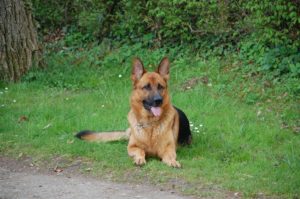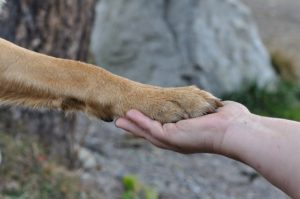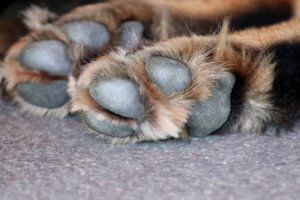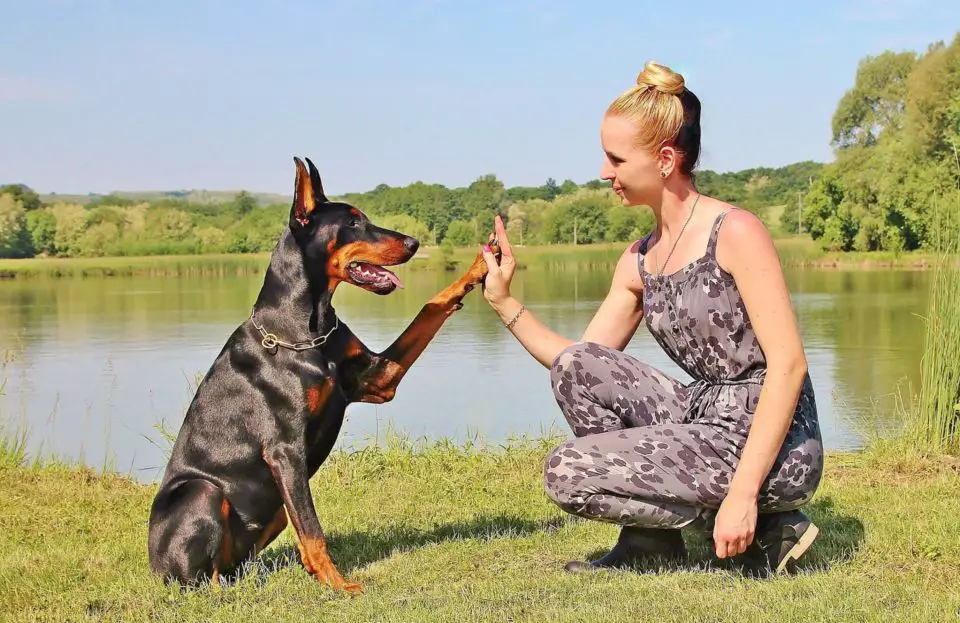Hello! My name is Nance and I have had the fortune to be the proud owner of my German Shepard, Fang for a few months now.
Recently he has started licking his paws a lot more frequently and so I wanted to ensure that I was doing everything I could to keep Fang happy and healthy.
 I am now sharing what I have learnt with you.
I am now sharing what I have learnt with you.
The good news is that paw licking is a completely natural and normal behaviour, however, if it is causing discomfort by biting and licking until they are raw or bleeding them there is a problem which may require veterinary attention.
So let’s start with the basics, why do dogs lick their paws?
Why do Dogs Lick Their Paws?
There can be many reasons for this to happen, the main area I would recommend to check first is that there is no foreign object in there paws such as a pesky thorn.
If you cannot find any cause of injury, then I would suggest seeing if if your dog has any allergic reactions.
The main areas I would recommend to check is if they are allergic to pollen, grass, cleaning solutions or food.
If your dog is not allergic to these then there are other factors that you should look into.
I would think after checking these areas is that you should have a good look at the paw as there could be foreign objects or small cuts that have become irritated and are causing your dog to nibble at their foot.
If none have these have solved your problem I would think to check if the cause is fleas and mites that could be biting the paw and causing it to become inflamed, this is worth checking carefully as this could be pestering your dog all over.
A cause that you may not think of that could cause your dog to be licking their paws is that they are bored which that is an easy way to fix, just grab their nearest toy and get playing!
Examination of Their Paw
 The best way to start is to go and examine their paw, take a good at their paw by moving back the hair and checking in all the nooks and crannies.
The best way to start is to go and examine their paw, take a good at their paw by moving back the hair and checking in all the nooks and crannies.
What you should be looking out for is any cuts that are on the paw, any foreign objects like a small piece of class that has got stuck or matted hair that may have become entangled around the dogs feet and causing the irritation.
While you are looking at the toes remember that at the base of them is the favourite place for ticks to live so keep those eyes peeled.
I have had to deal with many ticks in my time, nasty buggers!
Distraction
If you believe that the reason your dog is licking its paws is that it is bored then try distracting them, this could be done in many ways for example giving a treat or a toy when you notice that the dog is licking their paws again.
For when you are out you can get toys that go off at different times in the day that they can play with which could help them stop chewing
Cleansing the Paw
I would recommend that you bath their paw once a day to help remove the allergens that may be affecting the paws of your dog. For the bath I would use lukewarm water, the quantity of this would be down to the size of the dog.
Then add iodine into the water till it changes into the colour of ice tea. The dogs paw should stay in this between 30 seconds to 1 minute to allow the solution to get into the paws.
After this use a clean towel to pat their paws dry and do not worry if they start licking their paws afterwards as iodine is not harmful to dogs.
If you do not have any iodine I would recommend using a warm water oatmeal bath. The natural oils should help to heal any cracked paws and reduce the inflammation caused by licking.
To make this bath dissolve a couple of cups ground oats of which should be unsweetened and unflavoured in lukewarm water and get your dog to keep its paws in there for around 10 minutes.
If these do not take your fancy then there are a lot of other methods to help cleanse your dogs paws.
The video below may help you out!
Dealing With Ongoing Cuts
If the bath has not helped to rid your dog of an inflamed paw, the next step could be to antibacterial ointment for their paw.
If you apply this to their paw and wrap a bandage around this it should help to bring the inflammation down and help your dog to get on doing normal dog business.
Fleas, Ticks and Mites
If your dog is still licking their paw then maybe it is fleas, ticks or mites that is causing the problem.
Even though if it is these then it is more likely to be making your dog itch and scratch all over not just their paws, the main infestation could be centralised around their paw.
If this is the case then you will need to get some anti flea solutions like anti flea dip, powder or bath to treat this.
As these are likely to be spread around the house make sure you get the areas that are where the dog spends their time most like the dogs bed or if they are anything like my dog the kitchen floor as he is always waiting for food.
To help deal with with irritated dog skin, you could start using Omega bites. Here is my best pick as this helps with a lot of other problems your dog could be having which are associated with itchy paws.
Omega 3 Alaskan Fish Oil Chew Treats for Dogs
These Omega bites for dogs are designed to support their coat and skin and is suitable for dogs of any age.
They aim to keep itching, shedding and irritation at bay, to keep your dog feeling their best!
However, I would recommend seeking advice from a professional if you can to find the best treatment specifically for you pooch.
Helpful tip, always look out for the promo codes.
Food
Food can have a big impact on your dog, low quality dog food can cause dry and itchy paws.
If you are buying low quality food for you dog then I would first recommend going for a higher quality brand of food as this could help deal with the problem.
As finding if a dog is allergic to food is difficult and changing to a high quality food source has not helped, then I would recommend taking your dog to the vet as they can help to establish what your dog is allergic to.
It’s always best to give your vet a call or visit, if you’re unsure, as in my experience, they always know what to do!
Final Thoughts

There are many reasons why your dog could be itching and biting their paw a lot.
I have found out these methods to help my little fang and hopefully your dog.
Please leave a comment and share this post! We would love to hear if this has helped you and any other questions you may have.


